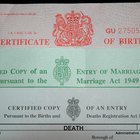
Comstock/Comstock/Getty Images
The idea that you can check someone's assets, such as bank and brokerage accounts, by means of a Social Security Number is a persistent urban myth. It's not that it can't be done in other ways, but with a few exceptions, it's illegal. There are other ways you can locate assets, with or without a SS number, but you have to be careful not to exceed your legal right to access this information.
Promises That Sustain the Myth
If you go online and google "check assets using a social security number," you'll find any number of private investigation ads offering to do just that. Is it legal? Like a lot of life's questions, the answer is "maybe" or "sometimes." One thing that's definitely true is that there's no magic online source into which you can plug a SS number and come up with a list of assets. That doesn't exist. Under the 1974 Privacy Act, Federal agencies may not disclose information without consent unless certain exceptions apply to the disclosure.
However, for trained investigators, coming up with asset locations and amounts isn't particularly difficult. In our everyday life we leave a trail of information breadcrumbs behind that establishes a lot of asset and SS information: job applications, credit reports, legal proceedings – especially divorce proceedings – public records and mortgage applications among them. Even if the investigator begins without a subject's SS number, it's there on your credit and job applications anyway, so getting it's hardly a big deal. Armed with all this data, an investigator can usually determine the locations and at least the approximate asset amounts.
But if you contact these firms, you'll also discover (assuming they want to keep their PI licenses) that you can't just waltz into a PI agency and pay it to get information on someone because you're curious. You need a good reason for obtaining this information.
What Are Good Reasons?
There are several good reasons for wanting to know. You're getting divorced, for example, and you think your spouse's declaration of assets is untruthful. Or you're owed child support or have an outstanding court judgment against someone who has declared he's insolvent.
Underlying most searches conducted for such reasons is a court order allowing it. Without a court order, the investigator can legally go only so far. He can determine the existence and location of a bank account, for instance, but cannot legally access the account itself to come up with an exact amount. On the other hand, most experienced investigators can come up with surprisingly accurate informed guesses. Armed with a court order, however, the investigator has a potent right to open all known channels of information, including Federal records and, yes, each and every bank and brokerage account.
Related Articles

How to Find a Prison Inmate in ...

How to Locate a Missing Person in ...
What Does the TSA Look for in a ...

How to Find Bank Accounts of Deceased ...

How to Find Out If I'm Related to ...

How to Find a Telephone Number in New ...

How Do I Get a Birth Certificate With ...

How to Find a Person Using a Social ...

How to Get a Copy of Our Marriage ...

How to Find Wholesale Authentic Handbags

What Is Jewelry Fencing?

How to Find a Person in California

How to Find a Birth Certificate for Free
How Old Do You Need to Be to Rent a Car?

How to Find a Person's Address for No ...

How to Find Someone in the U.S. Army

How to Check for an Original G-Shock
How Many Ounces Can You Take on a Plane

Jevity Nutrition Information
How to Void a Check
References
Resources
Tips
- Be advised that detailed information is normally obtained through a credit report. Simple searches may only reveal limited information. Most employers will be authorized to pull an employees credit report with the employees consent. Unless you are authorized, most individuals do not have the right to pull another person’s credit. If you are looking to locate assets of a person that is deceased, you can use a social security death index service offered by sites like Ancestry.com. You can also visit the department of vital records within your state to retrieve information on the deceased.
Warnings
- Unauthorized SSN access is a violation of law.
Writer Bio
I am a retired Registered Investment Advisor with 12 years experience as head of an investment management firm. I also have a Ph.D. in English and have written more than 4,000 articles for regional and national publications.
Photo Credits
Comstock/Comstock/Getty Images